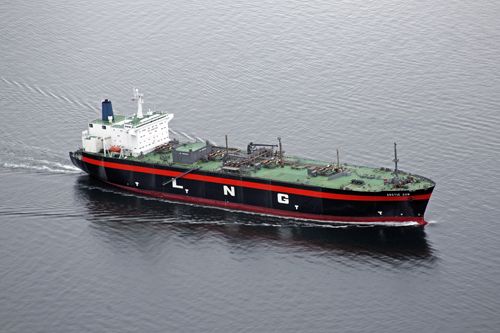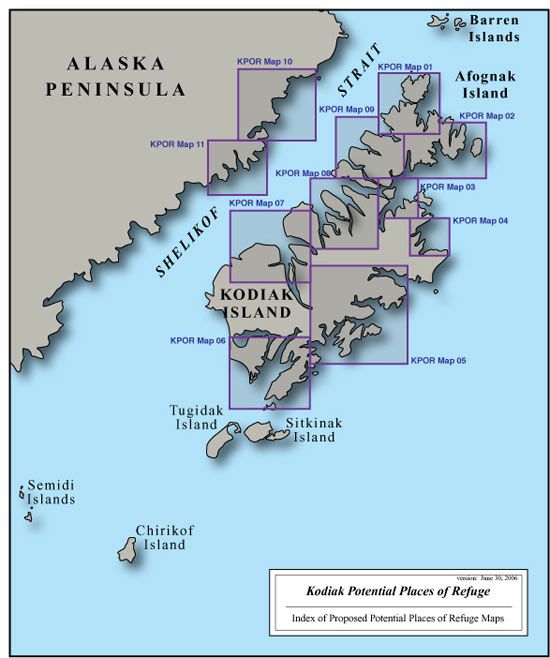Kodiak - Potential Places of Refuge

This webpage was used to assist the workgroup in the development of a document describing Potential Places of Refuge (PPOR) in the Kodiak Geographic Zone. The project was complete as of October 1, 2006.
The objective of this project has been to identify docking, anchoring, mooring and grounding locations that may be selected as Potential Places of Refuge in order to enhance the overall response process.
Site Selection Documents
The risk layers map depicts some of the risk factors the workgroup used in selecting potential places of refuge. The workgroup identified candidate sites for potential places of refuge. These sites were researched and the resources and attributes of each were placed in a site assessment matrix and key.
Potential Places of Refuge (PPOR)
- Kodiak PPOR Map 01 (PDF 2.3M)
- Kodiak PPOR Map 02 (PDF 2.6M)
- Kodiak PPOR Map 03 (PDF 2.9M)
- Kodiak PPOR Map 04 (PDF 2.9M)
- Kodiak PPOR Map 05 (PDF 3.1M)
- Kodiak PPOR Map 06 (PDF 3.M)
- Kodiak PPOR Map 07 (PDF 2.5M)
- Kodiak PPOR Map 08 (PDF 2.5M)
- Kodiak PPOR Map 09 (PDF 2.7M)
- Kodiak PPOR Map 10 (PDF 2.5M)
- Kodiak PPOR Map 11 (PDF 2.6M)
Kodiak PPOR Contingency Plan Document (PDF 257K) - includes introduction and references
Primary Project Participants
- Alaska Department of Environmental Conservation
- Alaska Department of Natural Resources
- Alaska Department of Fish and Game
- Alyeska Pipeline Service Company/Ship Escort and Response Vessel Service
- City of Kodiak
- Cook Inlet Regional Citizens Advisory Council
- Environmental Protection Agency (EPA)
- Kodiak Island Borough
- National Oceans and Atmospheric Administration (NOAA)
- Prince William Sound Regional Citizens' Advisory Council
- Southwest Alaska Pilots Association
- U.S. Coast Guard, District 17
- U.S. Coast Guard, Kodiak Marine Safety Detachment
- U.S. Department of the Interior
Invasive Species Considerations
Alien or invasive species include seeds, eggs, spores, or other biological material capable of propagating that species that is not native to an ecosystem. Invasive species commonly are transported in ballast waters and cargo associated oil transport and shipping. During operations any species that are encountered that are suspected to be non-native should be collected and presented to wildlife managers. Additional information on invasive species can be found in the “Useful Websites” section below.
Websites of Interest
Invasive species informative websites:
- Alaska Invasive Species Working Group
- U.S. Fish & Wildlife Service Invasive Species
- National Invasive Species Information Center
- Alaska Department of Fish and Game
- NOAA Fisheries Alaska Regional Office
For More Information
If you have local knowledge about the Kodiak Geographic Zone or for more information or questions pertaining to this project, contact dec.spar.ppor@alaska.gov



 Indicates an external site.
Indicates an external site.